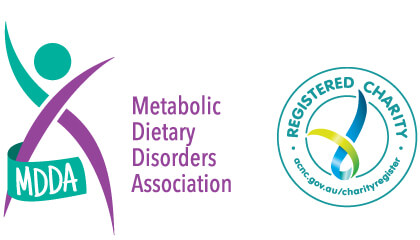Metabolic Dietary Disorders Association Inc (MDDA) are the national peak consumer body dedicated to supporting, educating, connecting, and representing all individuals their families and carers living with Inborn Errors of protein Metabolism (IEpM).
We are a patient run and led organisation that is largely voluntary based.
Our programs help support our goal of achieving positive health outcomes for all patients living with an IEpM requiring life-long metabolic dietary management skills, resources, and support.
There are more than 13 rare IEpM representing the estimated 2,500 individuals living with an IEpM in Australia and approximately 25 babies born each year. Most IEpM are screened for via the Newborn Bloodspot Screening Program or diagnosed in metabolic crisis.
IEpM are rare genetic disorders in which the body cannot properly metabolise protein. Treatment is complex and challenging requiring severely restrictive dietary management eliminating all forms of high protein foods such as eggs, meat, dairy, nuts, legumes, protein enriched foods and most grains from the diet.
MDDA offer specifically designed programs, products and services created to help support individuals and families navigate the pathways of managing their IEpM from newborn diagnosis throughout all life stages. These programs have been created by our dedicated team of MDDA staff and executive team of volunteers.
MDDA offers dedicated programs and services across multiple platforms through:
- National Freecall support line, regular eNews and online newsletters
- Annual National Family Conference
- Outreach IEpM Patient Pathways Program
- Adult IEpM Wellbeing program
- PeeKabU Newborn Starter kit
- PKU Compendium series
- Webinars, online educational forums, cooking days, fundraising events
- The Great Protein Challenge
- Patient/family only forums, social media platforms including: Facebook, Instagram, Twitter and YouTube
- Awareness campaigns
- Government advocacy
Since 1996 we have provided a range of national support and education services for IEpM patients, their families and carers, researchers, and medical professionals. We also provide advice and information to the Australian Government to inform government policy objectives and programs.
Please explore our website, read our stories and consider joining the IEpM community – we understand the importance of being part of a caring and informed support network.

Our Vision
All individuals living with an IEM are leading a life at full potential, not limited by choice or resource.

Our Mission
The MDDA educates, connects and enables individuals and families living with an Inborn Error of Metabolism (IEM) – ensuring more informed choices and a better quality of life.

Our Goal
Achieving positive health outcomes for individuals living with inborn errors of metabolism (IEMs), and requiring life-long metabolic dietary management skills, resources and support.
Our Strategic Priorities
The long-term purpose and objectives of the association are to provide a credible, supportive service to all people affected by, and living with a dietary managed Inborn Error of protein Metabolism in Australia.
